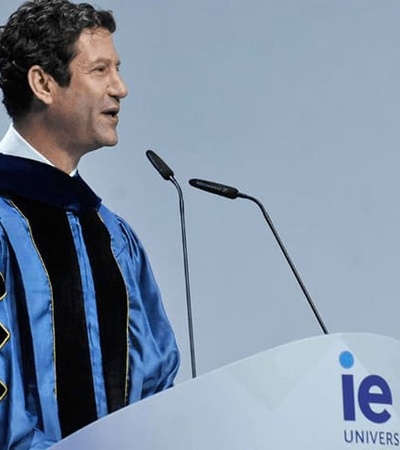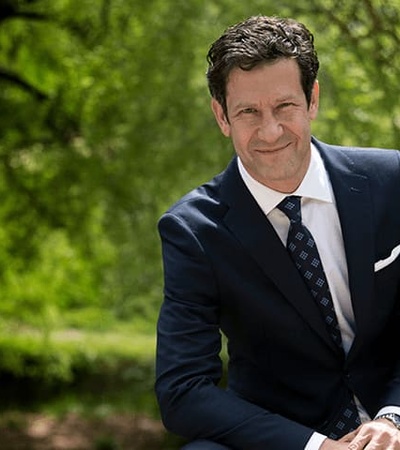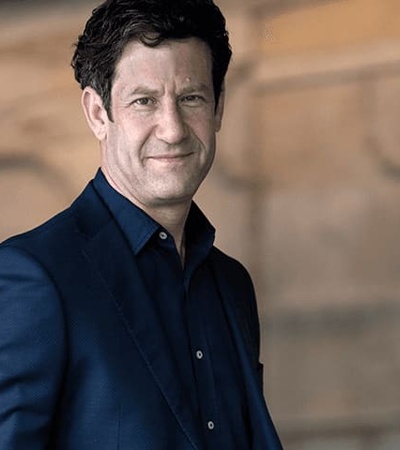Dean of IE Business School
- Home
- The School
- Dean Of Ie Business School
Lee Newman is the 9th dean of IE Business School and professor of Behavioral Science and Leadership at IE University.
He is an educational entrepreneur, a passionate teacher and thought leader who draws on his background and experience in business, human sciences, and technology to bring a disruptive and innovative approach to IE University’s first and largest school.
Newman’s thought leadership and teaching focus on positive leadership and a concept he refers to as “behavioral fitness.”
“Our performance at work is driven by our moment-by-moment behaviors that often occur with little awareness and conscious choice. By understanding our default behaviors, developing a broader behavioral repertoire, and learning to behave flexibly in different contexts, we become more behaviorally fit and more productive,” says Newman. “One of the most important roles of a leader is to put in place the conditions under which people in the workplace can thrive and perform at their best.”
Prior to his career in academia at IE University and the University of Michigan, Newman spent over a decade as a founder and senior manager in two technology startups in New York City and as a consultant at McKinsey & Company in Chicago, serving clients in the area of organizational performance and operations reengineering.
Newman is originally from the United States (St. Louis, Missouri) and now lives in Spain with his family.
THE DEAN IN THE MEDIA
WALL STREET JOURNAL
HOW MIXED OBJECTIVES CAN SINK A MEETING
In this article, Lee sheds light on a specific pitfall leaders make where they mix the objectives of a particular meeting. After investigating the root cause, Lee offers solutions to help balance the inspirational and transactional aspects of an executive’s job.
IT ISN'T WHAT YOU KNOW AT WORK. IT'S HOW YOU 'BEHAVE'.
Drawing on his Behavioral Fitness techniques, Lee makes a convincing case for how behavior and interpersonal skills can have a greater impact on real output than knowledge or potential.
HOW TO MEASURE - AND MANAGE - EMPLOYEE EMOTIONS
Drawing on research by leading positive psychologists, Lee outlines how you can effectively measure your employees’ emotions—and manage the data to promote a better work environment.
RAFAEL NADAL: MY EXECUTIVE ROLE MODEL
Lee draws on the behavior of his personal role model—decorated tennis champion Rafael Nadal—to demonstrate how executives should behave. And how it can give you a distinct advantage in crucial moments.
HOW TO GIVE WORKERS BETTER FEEDBACK
Feedback plays an essential role in professional development and productive output. In this article, Lee argues HR needs to play a larger role in giving real, ongoing feedback to actively help employees in their development.
HARVARD BUSINESS REVIEW
HOW TO OVERRIDE YOUR DEFAULT REACTIONS IN TOUGH MOMENTS
The way we react in tough moments is often an automatic reflex. In this article, Lee explains that, while this can be good, having the ability to override your default reactions to take better control in your professional day-to-day.
POETS & QUANTS
WILL LEE NEWMAN BECOME THE WORLD’S MOST VISIONARY B-SCHOOL DEAN?
To Lee Newman, the business school market has been something of a fireworks show. Each business school puts up a loud display of what it stands for, and each one is pretty much like the other. Newman, newly installed as the dean of Spain’s IE Business School, is hoping to make the MBA experience more like a rocket than a bunch of noise, light, and smoke in a dark sky.
THINKERS 50
DEAR CEO
Lee was asked to contribute to this renowned Thinkers50 publication in which top business leaders write letters to the fictional CEO of a company. In his contribution, Lee suggests a new approach to leadership designed to achieve singular advantages by understanding the “‘what,’ ‘why,’ ‘how,’ and ‘when’ of human behavior.”
IN CONVERSATION WITH LEE NEWMAN
Written by renowned British journalist Des Dearlove, this conversation with the IE Business School Dean focuses on the merits of behavioral advantage. Arguing that sustaining a traditional competitive advantage is no longer viable, Lee outlines a framework for success based on behavior.
FORBES
USE THE NEW YEAR TO IMPROVE YOUR BEHAVIORAL FITNESS AT WORK
Written at the turn of the new year, Lee advocates for a strategic approach to improve your Behavioural Fitness and navigate the increasingly complex space of modern professional life.
FINANCIAL TIMES
THE PURSUIT OF HAPPINESS IN THE WORKPLACE
IE’s Executive Master in Positive Leadership & Strategy and Lee Newman mentioned in article “The Pursuit of Happiness in the Workplace” by The Financial Times.
EFMD GLOBAL NETWORK
GETTING “BEHAVIORALLY FIT”
Writing for Global Focus, Lee discusses the benefits of “Behavioural Fitness.” He argues that the quality of your behavior is what makes you stand out as a professional, and that it can be developed through training.
EXPERIENCE & EDUCATION
IE UNIVERSITY AND IE BUSINESS SCHOOL (MADRID/SEGOVIA, SPAIN)
2021-Present | Dean, IE Business School
2015-Present | Member, IE Executive Committee
2010-2021 | Dean, IE School of Human Sciences & Technology
UNIVERSITY OF MICHIGAN (ANN ARBOR, USA)
2009 | Ph.D. Psychology (Cognitive) and Computer Science (AI)
2009 | Marquis Award for Best Dissertation in Psychology
2006 | Member, Executive Committee; Departmental Associate
HR ONE, INC. (NEW YORK, NY)
1999 – 2002 | Founder & EVP Of Product Development
BRAINSTORM INTERACTIVE , INC. (NEW YORK, NY)
1996-1999 | Founder & Chief Operating Officer
MCKINSEY & COMPANY, INC (CHICAGO, IL)
1991-1995 | Engagement Manager
M.I.T. SLOAN AND M.I.T. (CAMBRIDGE, USA)
1990-1992 | S.M. Management Science (systems dynamics, innovation)
1989-1991 | S.M. Technology & Policy
BROWN UNIVERSITY (PROVIDENCE, USA)
1985-1989 | Sc.B. Electrical Engineering (magna cum laude, with honors, Tau Beta Pi, Sigma Xi)
SELECTED ACADEMIC PUBLICATIONS
SELECTED ACADEMIC PUBLICATIONS
MANAGEMENT & DECISION MAKING
- Sterman, J.D., Henderson, R., Beinhocker, E.D., & Newman, L.I. (2007). Getting big too fast: Strategic dynamics with increasing returns and bounded rationality. Management Science 53(4), 683-696.
- Newman, L.I., Polk, T.A., & Preston, S.D. (2008). Revealing individual differences in the Iowa Gambling Task, In B. C. Love, K. McRae, & V. M. Sloutsky (Eds.), Proceedings of the 30th Annual Conference of the Cognitive Science Society (1067-1072). Austin, TX: Cognitive Science Society.
COGNITIVE NEUROSCIENCE
- Polk, T.A., Lacey, H.P., Nelson, J.K., Demiralp E., Newman, L.I., et. al. (2009). The development of abstract letter representation for reading: Evidence for the role of context. Cognitive Neuropsychology 26(1), 70-90.
- Park, J., Newman, L.I. & Polk, T.A. (2009). Face Processing: The interplay of nature and nurture. The Neuroscientist 15(5), 445-449.
- Newman, L.I. & Polk, T.A. (2008). “The computational cognitive neuroscience of learning and memory: Principles and models”, in Guadagnoli, M., Benjamin, A., DeBelle, S., Etnyre, B. & Polk, T.A., Human Learning: Biology, Brain, and Neuroscience, (77-99). Oxford, UK: Elsevier Ltd.
- Newman, L.I. & Polk, T.A. (2007). The emergence of semantic topography in a neurally-inspired computational model. Proceedings of ICCM, Eighth International Conference on Cognitive Modeling, (103-108). Oxford, UK: Taylor & Francis/Psychology Press.
IDEAS FOR THE DEAN: ALUMNI INITIATIVE
Got a fresh idea? If you’re an IE Business School alum and you’re interested in contributing ideas to help shape the future of the institution, click the link below to get involved.









